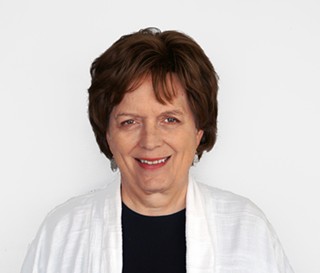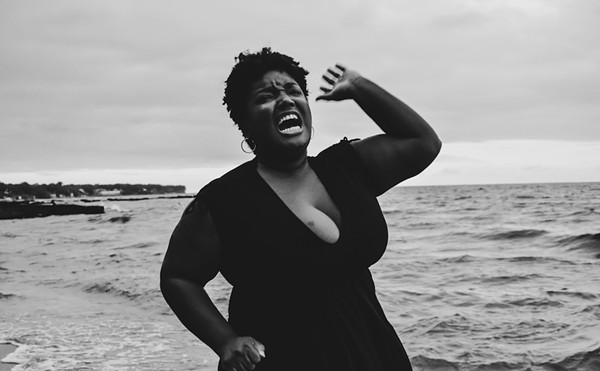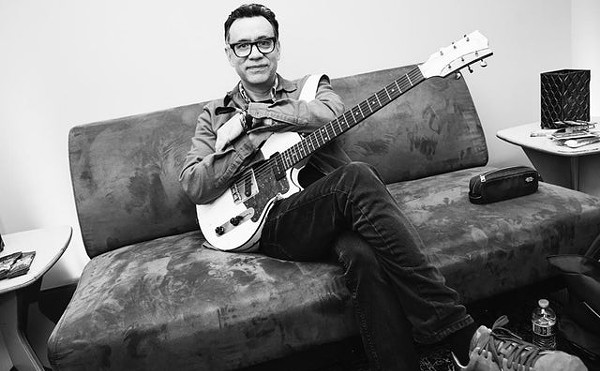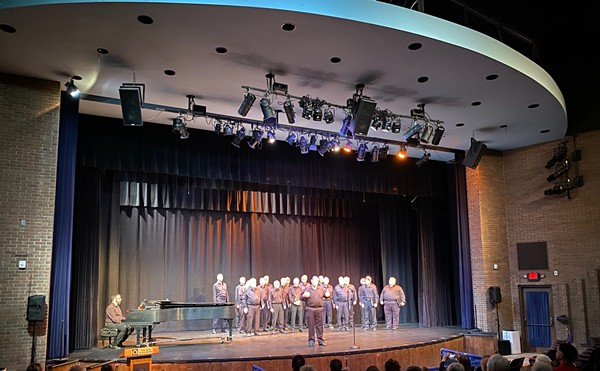Okay, it's not so much a play as a concert. But if you love to listen to singers croon the blues, you will not want to miss Blues in the Night, now at Karamu House.
This solid, slick and professional production is the first under the new reign of Tony Sias as president and CEO of this 100-year-old institution. And if the gloss evoked by this thoroughly enjoyable show is any sign, the future may appear to be very bright for theater at Karamu.
As written by Sheldon Epps, Blues in the Night features four performers who are sharing the same digs at a cheap hotel in post-Depression Chicago. We learn about their individual stories, such as they are, through the songs they sing. And these ditties — written by such blues luminaries as Bessie Smith, Johnny Mercer, Ida Cox and Duke Ellington — sketch out plenty of troubles with love and lovers.
Three of the characters are women who occupy rooms in this flophouse, elegantly rendered by scenic designer Richard H. Morris Jr. In the center room is the Lady from the Road played with good humor and gusto by Susan Hughes. The Lady takes on the task of narrating the proceedings, with occasional digressions into some blues pieces studded with equal parts of humor and raunch.
In one, "The Kitchen Man" by Andy Razaf and Wesley Wilson, Hughes gets down to the nitty-gritty with regard to culinary metaphors: "Oh how that boy can open clam/No one else can touch my ham/I can't do without my kitchen man." Indeed, Hughes is so good with these funny songs that her later straight presentation of "Wasted Life Blues" almost pales in comparison.
If Hughes is the woman who channels naughty sexual references and acerbic laughs, it is Nicole Sumlin, the Girl with a Date, who is beset by the most emotional trauma. From her hopeful opening solo, "Taking a Chance on Love" to a touching take on the classic "Willow Weep for Me" by Ann Ronell, she traces a love affair gone wrong.
It all ends in Sumlin's devastating display of misery in "Reckless Blues" by Bessie Smith, showing where the arc of the blues will take you. With that song, Sumlin uses Smith's simple lyrics to squeeze out maximum pain. "My mama says I'm reckless, my daddy says I'm wild/I ain't good lookin' but I'm somebody's angel child."
In the third room is Michele Edwards-Whitfield who plays the Woman of the World and executes a lovely, slow and digging version of "Stompin' at the Savoy" by Benny Goodman and others. Although she doesn't etch as memorable a persona as the other two women, Edwards-Whitfield has some stellar moments.
One of these occurs in "Rough and Ready Man" by Alberta Hunter, in which she chides and goads her man to be more macho: "When he snores I want the force to blow the bedclothes to the floor/And the breezes from his wheezes to knock the padlock off the door/I want a two-fisted, double-jointed, rough and ready man."
As it happens, there is a dude on hand in the person of Reggie Kelly who plays, you guessed it, the Man. Kelly is every inch a man, striding and posturing like the cock of the walk when he's not running or cowering in fear from the women who share the night with him.
And Kelly is their equal in the singing department, weaving the clever lyrics of "Wild Women Don't Have the Blues" by Ida Cox in and around several other songs. Kelly oozes stage presence from every pore and it's a treat to just watch him walk up to a lady, since every carefully orchestrated step is infused with equal parts longing and desire.
Perhaps it makes sense that Kelly embodies so much of the blues in his every move, since he is also the director of this superb production (while tripling as the choreographer). He has clearly gotten the most from his design team, since the lush costumes by Inda Blatch-Geib and the work of scenic artist Yulia Gray paint a nicely detailed period panorama.
The only quibble is that the women often perform their songs from 20 feet upstage, in their rooms, while the apron of the stage is used mostly for dancing performed with elegance by Imani Jackson and Kevin Marr. How much more powerful the songs would be if the women were closer to the audience.
The talented cast is backed up by a small band with Dr. David M. Thomas and Ed Ridley on keyboards, Bobby Curry on bass and Michael Jenkins on percussion. Their mellow sounds merge perfectly with the voices to create remarkably evocative results.
Change is always hard for an organization such as Karamu House. But the first show of the new regime is promising evidence that this grand institution is beginning its second hundred years in high style.












